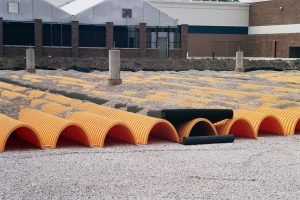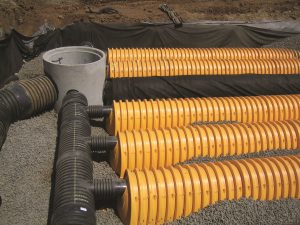With the United Nation’s Climate Change Conference (COP 26) closing recently in Glasgow, the publication of the Royal Meteorological Society’s State of the Climate report was particularly timely. The report showed that Britain had become an average of 6% wetter, over the 30 years from 1991 to 2020. Additionally, six of the 10 wettest years since 1862 have occurred since 1998.As Stuart Crisp, UK Manager of Advanced Drainage Systems (ADS) points out, “This significant increase in rainfall will not only challenge the UK’s drainage infrastructure, it could dramatically affect the management of our water quantity and quality.”
ADS is America’s largest manufacturer of corrugated thermoplastic drainage pipes and a specialist in water management systems. StormTech, their proprietary below-ground stormwater attenuation system, is now available in the UK.
“StormTech provides a durable solution for commercial, residential, industrial and infrastructure installations,” explains Crisp. “As part of an integrated SuDS system, StormTech helps provide valuable surface space for parking, playgrounds or other amenities, and has many benefits over alternatives such as geocellular crates, large diameter pipes and vaulted systems.”
These benefits have given StormTech a long and successful track record with over 40,000 installations worldwide, including the DC United stadium in Washington DC and Lidl stores across the USA, and international projects such as St Petersburg and Guernsey airports.
“One of StormTech’s biggest advantages is its design flexibility,” maintains Crisp. “The chambers are injection moulded to ensure consistent quality and performance. Even the colour and semi-elliptical shape are deliberate engineering choices. The chambers shape the embedment stone into structural arches forming load bearing columns. This makes StormTech more adaptable than other systems, as it’s the stone that transmits the majority of the load.”
Another key benefit is that StormTech chambers lock together to form a continuous, unimpeded void that provides easy access for inspection and maintenance. The wide range of unit sizes makes it easy to optimise systems for all conditions, including shallow invert depths and reduced footprints. The system is also highly adaptable and can be configured around obstacles and afford multiple inlet and outlet positions. Standard pipe manifolds, manholes, access chambers and flow controls can be used.
However, as Crisp suggests, one of the most important benefits concerns water quality. “StormTech incorporates Isolator Row – a unique, patented, in-built water treatment device which removes silt, sediment and other surface water pollutants. Isolator Row has been independently tested by universities and respected industry bodies and proven to remove over 80% of total suspended solids and other water-borne pollutants including metals, hydrocarbons, phosphorus, and nitrogen. Unlike other proprietary attenuation systems, Isolator Row provides a free water quality treatment device as an integral part of the stormwater attenuation system. This means that expensive pre-treatment installed upstream of the attenuation system can often be removed from the design.”
There’s also plenty of support for designers. StormTech’s Design Tool provides quick and effective system optimisation that integrates with CAD and other design, engineering, and specification documents. Sample designs and layouts are available, as are a team of specialist engineers. It is independently tested, BBA approved and fully compliant with ASTM F2787, F2418 and F2922. For installers, the SiteASSIST app includes comprehensive instructions and videos, making working with StormTech fast, easy and efficient.
“We also take our environmental responsibilities seriously,” continues Crisp. “StormTech affords low embodied carbon per cubic metre of attenuated water compared with alternative systems and is recyclable.”




